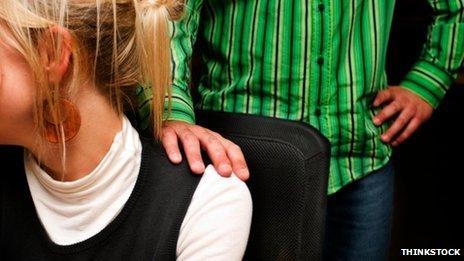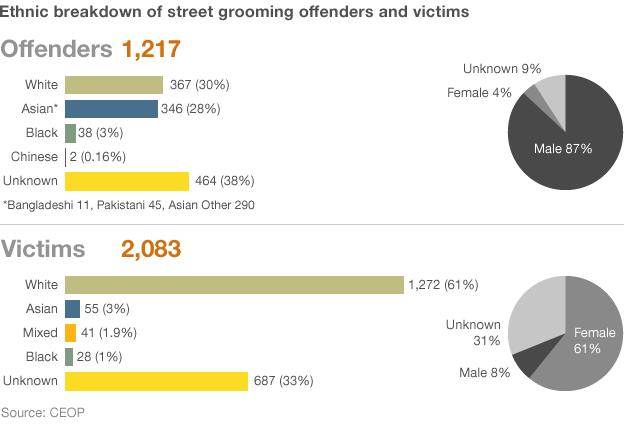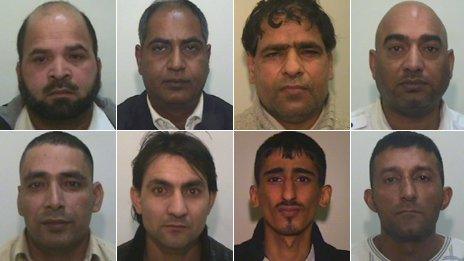Grooming and race - what do we know?
- Published

There are contrasting views on the role played by race and culture in the trafficking and street grooming of young white girls by some men
The jailing of nine men who sexually exploited girls as young as 13 in Greater Manchester shone a light on a murky underworld that exists across the UK but few people are aware of.
Some have focused on how the victims were white and their tormentors nearly all of Pakistani heritage and questions were raised over whether race was a factor in this case. Is there any consensus about whether race has played a part in such crimes?
Liverpool Crown Court heard how victims were plied with drink and drugs and "passed around" for sex as though they were "worthless and beyond respect".
Judge Gerald Clifton said to the men, eight of Pakistani origin and one from Afghanistan, that one of the factors leading to the abuse was "the fact that they were not part of your community or religion".
But to what extent, if any, is race an issue in such cases? And are these crimes indicative of a wider problem?
It is not the first time such a claim has been raised.
Last year, former home secretary Jack Straw said some UK Pakistani men saw white girls as "easy meat" for sex abuse.
Mr Straw said there was <link> <caption>a "specific problem" in some areas where Pakistani men "target vulnerable white girls".</caption> <url href="http://www.bbc.co.uk/news/uk-england-derbyshire-12141603" platform="highweb"/> </link>
Jack Straw: "We need to get the Pakistani community to think much more clearly about why this is going on"
At the time, fellow Labour MP Keith Vaz said it was not a cultural problem and it was wrong to stereotype a whole community.
Following the latest convictions Mr Vaz, who chairs the Home Affairs Select Committee, told the BBC: "I do not believe it's a race issue."
And assistant chief constable Steve Heywood, of Greater Manchester Police, said the case was not about race, but "adults preying on vulnerable young children".
But some disagree.
Mohammed Shafiq, of the Ramadhan Foundation, which aims to promote better understanding between Muslims and non-Muslims, said: "Clearly, as members of the Pakistani community we've got to say to ourselves, yes, we've got a problem. We've got a problem because these people think white girls are worthless, they think they can use these girls.
"This is not sex, this is rape, these were children and I think we've got to speak out against this very openly."
Mark Williams-Thomas, a former police detective and child protection expert, believes there is a trend which he says he was first made aware of 10 years ago in which men of Pakistani heritage abuse white girls.
But the former detective called for a more nuanced view of the problem, saying it was important to distinguish between grooming and the trafficking of young girls.

"Attacks in isolation and grooming tend to be perpetrated by white men. Collectively, the transferring of girls among young men for sex involves Pakistani men," he said.
"This is a significant problem and it's been going on for many years.
"Evidence tells us that there is a significant problem with Pakistani Asian men. We've got to be bold enough to stand up and say this is a problem and not let it get hijacked by the far right. It's only now that people are prepared to discuss this."
Mr Williams-Thomas said he was unsure why the trend appeared to exist, stressing it was "a complex issue" that could involve factors such as disparities in the age of sexual consent in the UK compared with other countries and their perception of females. He said there needed to be research and better cultural engagement.
He cited research by Ella Cockbain and Helen Brayley, of UCL's Jill Dando Institute of Security and Crime Science, which suggested the vast majority of more than 50 individuals charged with trafficking offences were of 'Pakistani Asian' origin.
However, the report's authors have previously said they were <link> <caption>surprised their research had been cited in support of claims that such offences were widespread.</caption> <url href="http://www.guardian.co.uk/law/2011/jan/06/child-sex-trafficking-racial-stereotyping" platform="highweb"/> </link>
Statistics about child exploitation and race are difficult to verify.
<link> <caption>Research conducted by the Child Exploitation and Online Protection Centre (Ceop) on "localised grooming"</caption> <url href="http://ceop.police.uk/Publications/" platform="highweb"/> </link> - where children have been groomed and sexually exploited by an offender having first met in a public place - looked at 1,217 offenders.
The findings, published last year, found 30% of offenders - 367 - were white. Some 28% were Asian, of whom 11 were Bangladeshi, 45 were Pakistani and 290 were described as "Asian Other".
Of the victims, 61% of the 2,083 victims were white, while just 3% were Asian. Some 33% were of referred to as "other".
But the report stresses national conclusions about ethnicity cannot be drawn from the data available because it relies on limited nationwide information, with much of the data coming from a limited number of areas.
Ms Brayley told the BBC it was "difficult to know who is involved and what is going on" because different police forces and agencies use terms such as "localised grooming", "street grooming" and "internal trafficking" which all have slightly different meanings.
"You're not always comparing like with like," she said, explaining it meant the police had a "difficult job" establishing the scale of the problem or trends involving perpetrators.
Ms Brayley said a clear definition of the offence would make it easier to gather definitions of the offence and establish a nationwide picture.

The men plied their victims with drink and drugs so they could "pass them around" for sex
Prof Malcolm Cowburn, a criminologist based at Sheffield Hallam University, who has studied issues related to sexual violence over the last 15 years, said he "had not seen any empirical evidence to say that one group of people has a greater proclivity to sexual violence than any other".
"The larger issue is of problematic masculinity and how certain men view women, children and their sexual rights. I don't think it lies within ethnicity but within gender," said Prof Cowburn, whose work has been published in the Journal of Sexual Aggression and the British Journal of Community Justice.
"It's a failure of empathy. Certain men and sex offenders don't show any empathy to the people that they harm."
But in the debate about perpetrators, charities say victims must not be forgotten.
Martin Narey, of the Barnardo's children's charity, believes society should also ask why the victims, who tend to come from chaotic family backgrounds and children's homes, are easy prey.
"For several years now British society has been agonising over how to combat the danger of paedophiles operating on the internet.
"Now it needs to find a way to shut off another avenue for abusers, which is just as insidious."
- Published8 May 2012
- Published8 May 2012
- Published8 May 2012
- Published8 May 2012
- Published8 May 2012
- Published8 May 2012